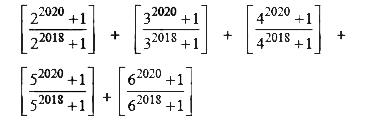For a real number r let [r] denote the largest integer less than or equal to r. Let a>1 be a real number which is not an integer and let k be the smallest positive integer positive integer such that [ak]>[a]k. Then which of the following statements is always true?
k≤2([a]+1)2
k≤2([a]+1)4
k≤2[a]+1
k≤1a−[a]+1
The correct Answer is:B
By talking different values of a & k.
options (B) is possible.
Topper's Solved these Questions
- KVPYBOOK - KVPY PREVIOUS YEARCHAPTER - KVPYEXERCISE - PART-II MATHEMATICS
10 Videos
- KVPYBOOK - KVPY PREVIOUS YEARCHAPTER - KVPYEXERCISE - Part A - Mathematics
20 Videos
- KVPYBOOK - KVPY PREVIOUS YEARCHAPTER - KVPYEXERCISE - PART-2(MATHEMATICS)
10 Videos
- KVPY 2021BOOK - KVPY PREVIOUS YEARCHAPTER - KVPY 2021EXERCISE - PART II MATHEMATICS
4 Videos
Similar Questions
For a real number x, let [x] denote the greatest integer less than or equal to x. Let f: R→ R be defined as f(x)=2x+[x]+sinxcosx then f is
View SolutionFor a real number x, let [x] denote the greatest integer less than or equal to x. Let f: R→ R be defined as f(x)=2x+[x]+sinxcosx then f is
View Solution
Knowledge Check
For a real number x let [x] denote the largest number less than or equal to x. For x∈R let f (x)=[x] sinπx. Then
AIf is differentiable on R.Bf is symmetric about the line x=0C∫3−3f(x)dx=0DFor each real α, the equation f(x)−α=0 has infinitely many roots.Let [x] be the greatest integer less than or equal to x, for a real number x. Then the following sum

is-A80B85C90D95For a real number x let [x] denote the largest intger less than or equal to x. The smalleset positive integer n for which the integer ∫n1[x][√x]dx exceeds 60 is-
A8B9C10D[602/3]
For any real number x, let [x] denote the largest integer less than or equal to x. If
∫100[√10xx+1]dx then the value of 9I is
View SolutionFor a real number x let [x] denote the largest integer less than or equal to x and {x}=x−[x] Let n be a positive integer. Then ∫n0cos(2π)[x]{x})dx is equal to
View SolutionFor a real number x let [x] denote the largest integer less than or equal to x and {x}=x−[x] Let n be a positive integer. Then ∫n0cos(2π)[x]{x})dx is equal to
View SolutionFor a real number x, lel [x] denotes the griater + integer less than or equal to x. let f:R→R be defined by f(x)=2x+[x] then f is:
View SolutionLet [x] denote the greatest integer less than or equal to x for any real number x. then limx→∞[n√2]n is equal to
View Solution
